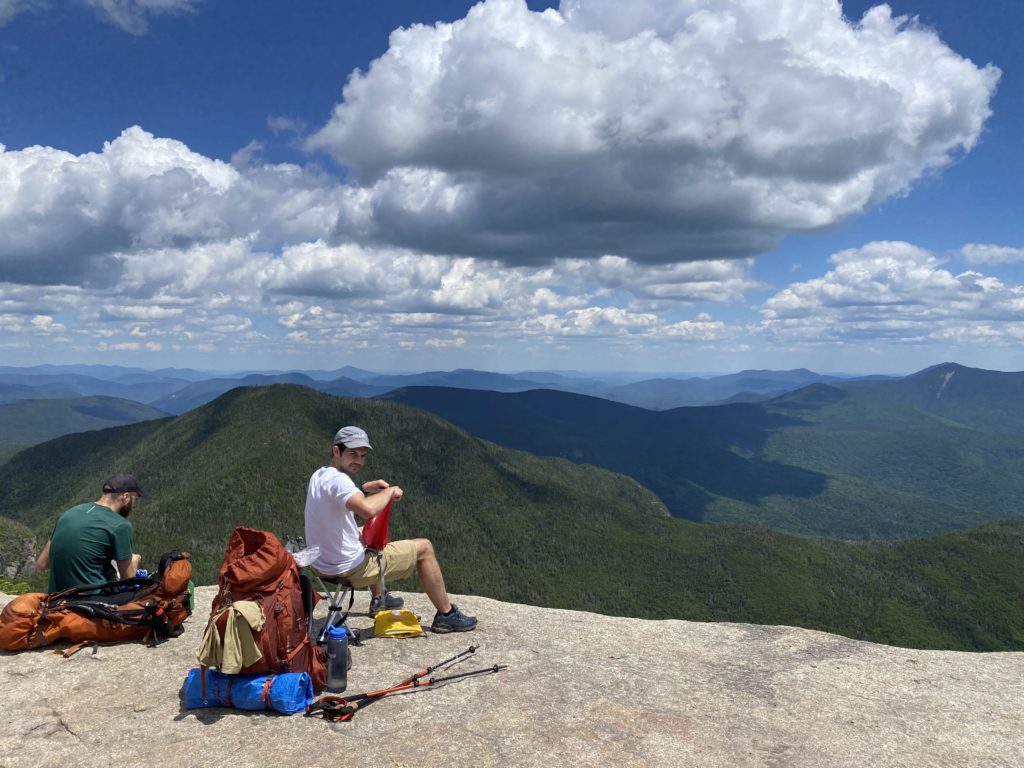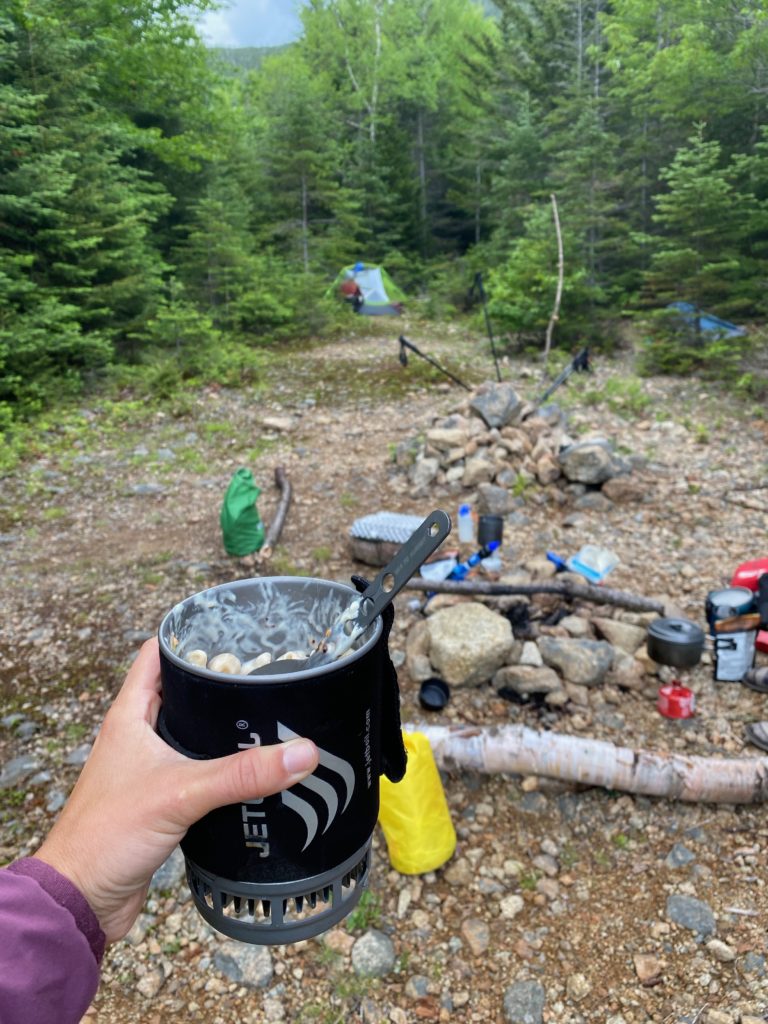This past weekend was my first overnight backpacking trip of the 2021 season – a gorgeous Mad River Loop in the White Mountains. I LOVE backpacking – the ability to carry everything I need to survive right on my back, the weird jokes you end up making with friends, the endless green tunnels, critters, mountain top views and dark starry nights… it’s all so magical!
A fun aspect for me, being a dietitian, is planning what to bring for food on my trips and making sure I’m fueled and satisfied. I’ll never quite know what I’ll be craving, but I always make sure to bring more than enough food in case of emergencies, or for the less scary, more fun, food-sharing with buds. Everyone loves a mountain pot luck!
Other than some thought going into logistics with food and what I may crave or need based on milage, weather, and ease of clean-up, not much more thought goes into food. I just know I have to eat often to avoid the dreaded “bonk”, a phenomenon that can happen when you are physically active and don’t fuel enough, leaving you feeling empty, lagging, and unable to continue hiking. I am very privileged to not have to put more thought, effort, or experience worries around my fueling.
As my friends and I hiked out of our backcountry camp spot and towards the steep, rocky climb of East Osceola from Greeley Ponds, we passed a woman hiking by herself, totally crushing it. We yo-yoed with her a bit, then she passed us as my friends and I took our last snack break before reaching our second 4,000 footer of the day, Mount Osceola.
We reached the top of Mount Osceola where about 6 other people were enjoying the scenic 180 degree view of the Whites. A hiker started chatting with me about how my friends and I were backpacking, and what type of food one should bring on these trips. Nate showed the hiker his block of cheese, and we laughed about how this may send a few lucky folks running to the bushes or constipated on trail, but is a great energy source. The amazing hiker that passed us earlier chimed in: “I’m definitely eating some Velveeta Mac and Cheese tonight. I know it’s so bad, but I love going on long hikes and half marathons that way I can eat whatever I want and not feel bad about it!”.

Her comment saddened me, and snapped me back into the reality that we are indeed not in a magical mountain fairy land where diet culture does not exist, but that we all live in a diet and weight obsessed culture that is as pervasive as the black flies at a White Mountain camp site in June. How awful is it that it makes us think we need to run for 13 miles straight or hike a bunch of 4,000 foot MOUNTAINS just to eat a bowl of mac and cheese?
We are convinced that our food choices and exercise are the main factors contributing to overall individual and population health, as well as our weight. We receive messaging from the time we can understand language that thinner=better athlete, better health, more self-control, more desirable, more lovable. We are told that what we decide to put in our mouth says a lot about you, and how dare you eat that cheeseburger and disregard the so obvious risk of cancer and heart disease?! It’s woven into our beliefs that the perpetual quest of achieving what we define as the best health status possible, no matter the cost, is a moral obligation, a badge of honor, and anyone who does not abide shall meet side-gazes of disapproval and pity.
But is this all true? Does eating pizza every Friday night mean you don’t care about your health? Does scooping yourself some ice cream every night mean you have “no self control”? Do we need to earn our food with exercise and discipline? Well, why don’t we just quickly look at the facts here along with implementing some reflection and critical thinking.

What actually determines health? While I’m not disregarding the fact that nutrition and exercise affect health (because of course they do – hello I am a dietitian!), there are other more prominent, glaring factors that affect someone’s health outcomes throughout their life. These include, but are not limited to: genetics, economic stability, healthcare access and quality (both for physical and mental health), presence or absence of discrimination, education access and quality, neighborhood and built environment, social and community context/social cohesion, access to food and clean water, and lifestyle factors such as smoking and drinking alcohol. To put in other words – you can avoid all the mac and cheese that comes your way, but avoidance of some cheesy delicious goodness isn’t going to provide you with a roof over your head or health insurance that covers your chemotherapy.
We only have so much control over our health, and much less control over our weight than we’re told, and that is really scary for people to hear and accept. We’re actually used to being told to just “eat less and move more” and we’ll be fine. Simple right?! Well, if it were so simple, the diet & wellness industry wouldn’t be worth tens of billions of dollars. There would be no lifetime memberships available at Weight Watchers, and there wouldn’t be an entire section of Barnes & Noble filled with diet books with contradicting advice (Go plant based! No, go keto! Wait, go plant based AND keto but also add intermittent fasting! No… Intuitive Fasting!!!). I’m sure you, or someone you know, has gone on a diet, only to gain most or all of the weight back. Or you have noticed that even trying to “just eat healthier” by vastly cutting down on favorite foods just leads to eventual late night binges and a ticket into the restrict-binge cycle. Clearly, restriction is not really “working” for people.
What if we just ate what we want? What if yes, we put in some thought regarding our food choices – “What can we add to make this meal more nutrient-dense?” or “How can I be in better touch with my hunger and fullness cues?” – but also, if we were craving a food, we simply ate the said food without any guilt or morality attached to it? Because really, in the end, you are no better or worse of a person whether you order the salad with your burger or the fries. You don’t earn bonus points or add days to your life by running 5 miles just to go out for margs and burritos with your coworkers. It is not anyone’s moral obligation to strive for “perfect health” or the “perfect body”, because they don’t even exist. It just makes us more anxious about health and the way we look, and it makes us judge others and ourselves. So sure, add some baby carrots to your lunch or add some fruit and chia seeds to your yogurt, but depriving yourself of delicious, satisfying food really isn’t going to do much for you in the grand scheme of things.
So next time you catch yourself feeling the need to “do 1,000 sit ups to burn off 1 bag of chips” or whatever Dr. Google is saying these days, remember that you are so much more than your food choices, your health status does not define your worth, and you can’t tell someone’s health just by looking at their weight or what they eat. So lets throw those old diet culture beliefs off a cliff and hike back into life with a little less judgement, and a little more mac and cheese.

